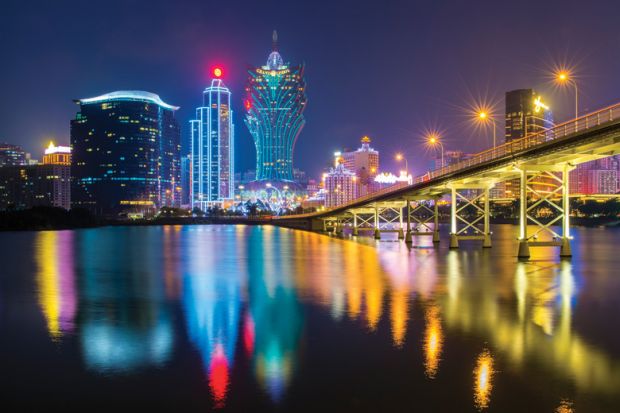The gambling hub of Macao might seem an unusual setting for a collection of Oxbridge-style colleges.
But Asia’s answer to Las Vegas has somewhat surprisingly chosen to base its new multimillion-pound university campus on the fabled college model found almost 6,000 miles away.
Two years ago, the University of Macau moved its 10,000 students, 650,000 books and about 60 laboratories from the semi-autonomous former Portuguese colony into China, settling on a site on the eastern edge of neighbouring Hengqin Island, in a new campus 20 times larger than its old one.
With the opportunity to take up to 15,000 students in future, the university is seizing the chance to overhaul its teaching and learning by establishing a new college system.
“It is a sea change from the old faculty-based structure,” said Kit Thompson, master of Moon Chun Memorial College, who joined Macau in 2013.
“We will have 14 colleges – eight are up and running now – and each will be multidisciplinary, but very different,” added Professor Thompson, a musician, composer and former principal of the Birmingham Conservatoire.
Each residential college in the university will seek to establish traditions of excellence in a different area, and undergraduates will be encouraged to immerse themselves in their college’s range of extracurricular activities, from music and drama to sport and debating.
“These are not dormitories – they are about people living and learning in a domestic setting,” said Professor Thompson, who believes that the clusters of about 450 undergraduates, master’s students and staff will help co-curricular activities to thrive.
“Some of the colleges have quite a Chinese character, while my own is quite British in its ethos, and each college will find its own distinctive style,” he added.
The collegiate system is not the only thing that sets Macau apart from other universities in China's southern Guangdong province.
It is surely one of the few universities in the world that can be accessed only by travelling underwater – via a kilometre-long tunnel running from Macao. As it operates under Macao law, the area is self-contained and access to China is cut off by concrete barriers.
Macao’s history as a former Portuguese colony, which, like Hong Kong, was returned to Chinese rule in the 1990s and is now a special administrative region, also means that it inherits a unique academic culture, Professor Thompson said.
“Macau has a particular advantage as we offer European law degrees, as well as those relating to Chinese law, which makes us one of the few places in the world doing this,” he said.
Macao’s semi-autonomy from Chinese rule also means that students and staff enjoy a greater degree of academic freedom than is found at other universities in China, where the influence of Beijing is felt more keenly.
For instance, students do not face the same internet restrictions thanks to an exemption from censorship enjoyed by the former colony: this makes Macau the only university on mainland China where students can access Twitter, YouTube and Facebook, which are banned by the Chinese state.
Students and academics at Macau can also discuss politically sensitive events, with university authorities insisting that this freedom will continue even with its campus now on China’s mainland.
With an estimated $12 billion (£9.2 billion) currently invested in turning Hengqin Island into a theme park-based family entertainment resort – a mix between Orlando, Florida (home of Disney World) and Las Vegas, according to developers – the university is also offering degrees related to its traditional strengths in tourism.
“We have specialist courses relating to the hotel and leisure industries, which are, of course, huge employers in Macao,” Professor Thompson said.
The college master himself is revelling in his role at Macau, with his college playing host to a selection of top artists, musicians and orchestras in recent months.
Indeed, Professor Thompson’s own musical pursuits – conducting the Macao Orchestra for a concert to mark the Queen’s Birthday in June – is just another example of British tradition prospering in an unusual setting.




